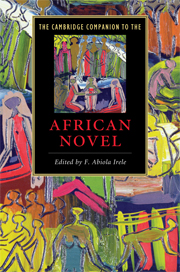Book contents
- Frontmatter
- 1 Introduction: perspectives on the African novel
- 2 The oral-literate interface
- 3 Chinua Achebe and the African novel
- 4 Protest and resistance
- 5 The Afrikaans novel
- 6 The African novel in Arabic
- 7 The francophone novel in North Africa
- 8 The francophone novel in sub-Saharan Africa
- 9 The African historical novel
- 10 Magical realism and the African novel
- 11 The African novel and the feminine condition
- 12 Autobiography and Bildungsroman in African literature
- 13 The postcolonial condition
- 14 New voices, emerging themes
- 15 The critical reception of the African novel
- Bibliography
- Index
7 - The francophone novel in North Africa
Published online by Cambridge University Press: 28 January 2010
- Frontmatter
- 1 Introduction: perspectives on the African novel
- 2 The oral-literate interface
- 3 Chinua Achebe and the African novel
- 4 Protest and resistance
- 5 The Afrikaans novel
- 6 The African novel in Arabic
- 7 The francophone novel in North Africa
- 8 The francophone novel in sub-Saharan Africa
- 9 The African historical novel
- 10 Magical realism and the African novel
- 11 The African novel and the feminine condition
- 12 Autobiography and Bildungsroman in African literature
- 13 The postcolonial condition
- 14 New voices, emerging themes
- 15 The critical reception of the African novel
- Bibliography
- Index
Summary
Given the intellectual vitality and the political relevance of current novelistic production in French, Jean Déjeux’s judgment according to which “‘Maghrebian’ literature is neither indigenous nor national” stands in need of critical reappraisal. After reviewing the Euro-Algerian figures beyond whose tradition the North African novel clearly asserted its cultural specificity and established distinct cultural identities, the following analysis will cover the broad fictional trends which major figures, now part of an internationally established canon, have defined from the 1950s to the present. / Writing passage / Literary history has so far paid inadequate attention to the production of pre-independence European-Algerian intellectuals who have explicitly written against the grain of the master discourse of colonization. Torn by the irreconcilable constraints of their Algerian identity, their political liberalism, their sympathy to the aspirations of Algerian independence, and the singularity of their ideology, they wrote about “the colonial condition that inexorably rots everything.” Some of the works by Emmanuel Roblès (1914–95) and Jean Pélégri (1920–2003), both members of the so-called École d’Alger which also included Albert Camus, bear witness to the passage of an era and the beginning of another time, to paraphrase one of Pélégri’s fully drawn Algerian protagonists. They best illustrate the dilemma of commitment and belonging that tore asunder the political consciousness of engagés European-Algerian writers who were heeding Camus’s own observation, as early as 1939, that working conditions in Kabylie were in keeping with those of a slavery system and that the days of colonialism were numbered.
- Type
- Chapter
- Information
- The Cambridge Companion to the African Novel , pp. 103 - 124Publisher: Cambridge University PressPrint publication year: 2009

